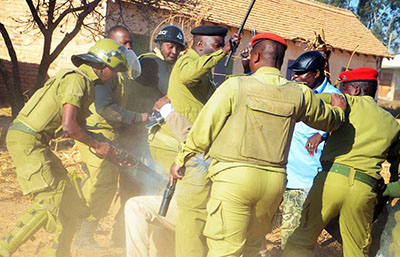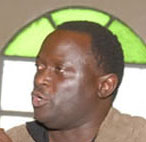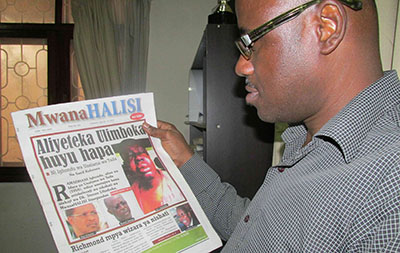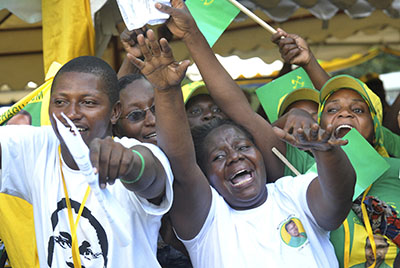The Tanzanian government enjoys good international publicity for transparency, but news of public discontent is not being heard. A spike in anti-press attacks is sowing fear and self-censorship among journalists. A CPJ special report by Tom Rhodes

Published August 6, 2013
DAR ES SALAAM, Tanzania
It took all of five minutes for two assailants to carry out the horrific attack on editor Absalom Kibanda, lopping off the top of his right ring finger, piercing his left eye, and prying out several teeth and fingernails. Kibanda’s cell phone and national identity card were taken, but his cash-filled wallet and iPad were left behind, signs the March assault was motivated by something other than robbery. He is back home today, after receiving treatment in South Africa, but his assailants are still at large. Kibanda lost the eye—a glass one is now in its place—and he certainly lost his sense of security after those terrifying moments outside the gate to his home here in Tanzania’s largest city.

“How can I come back to a place where no investigations have taken place?” said Kibanda, managing editor of the New Habari newspaper chain. “I still don’t know if they want to kill or torture me.”
Police say their investigation is continuing, but journalist Deodatus Balile, who is leading an independent inquiry on behalf of local press associations, says officers are nowhere close to making any arrests. Police have seemed to flail about at times, at one point accusing another journalist in the attack only to quickly withdraw the allegation. With virtually every aspect of the case a mystery, the assault has sent a chilling message to the press. Ansbert Ngurumo, an outspoken columnist and managing editor of Tanzania Daima, a daily run by the opposition Chadema Party, said he is now taking numerous precautions, routinely shifting his lodging, avoiding risky places, and putting a halt to his driving. Kibanda has been a long-time colleague, working alongside Ngurumo at the paper for many years.
More in this report
• CPJ’s recommendations
In print
• Download the pdf
The attack on Kibanda is not isolated. CPJ has documented 10 serious anti-press attacks and threats since September 2012, a notable jump over historical trends in the country. In September 2012, veteran cameraman Daudi Mwangosi was killed while covering an opposition rally in a rural area outside Iringa when a police officer fired a tear gas canister at him at close range. Mwangosi—who was fired upon during an altercation with several officers that was sparked by the arrest of a colleague—was the first Tanzanian journalist killed in direct relation to his work in the two decades since CPJ began keeping detailed records. Authorities filed murder charges against Pacificus Cleophace Simoni, the junior officer who fired the canister, and the case is pending. But they did not pursue charges or disciplinary action against six other officers who a video shows were involved in the violent confrontation with Mwangosi, according to a report released by the independent Media Council of Tanzania. The officer who oversaw the police presence at the rally, Regional Police Commander Michael Kamuhanda, was later promoted to deputy commissioner of police, according to news reports.
The rise in anti-press attacks against the press, set against a backdrop of repressive media laws, is sowing self-censorship among Tanzanian journalists, especially those working in rural areas. Public protests against the government in rural places such as Mtwara have gone uncovered as a result of this fear. The trend jeopardizes independent news coverage at a moment when the Chadema Party is making its first real inroads against the ruling Chama Cha Mapinduzi, which has dominated Tanzanian politics since the country gained independence five decades ago. It also calls into question Tanzania’s international image as home to good governance. In his first visit to East Africa, in July, U.S. President Barack Obama praised Tanzania for its commitment to transparency and democracy.
President Jakaya Kikwete’s office did not respond to CPJ’s request for comment for this report. Kikwete’s record on anti-press attacks and other press freedom issues has been mixed. He denounced the attack on Kibanda and visited the hospitalized editor. But he never directly condemned the police actions that led to Mwangosi’s death, and he has been largely silent about legislative reform efforts.
Few news outlets covered May and June unrest in the rural southern town of Mtwara. Angry local residents say President Kikwete reneged on a campaign pledge to build a local refinery for gas reserves, instead pursuing plans to build a gas line that would send the reserves to a refinery in Dar es Salaam, local journalists said. The Mtwara protests and perceptions that police used excessive force to suppress the demonstrations have been under-reported, said Mohammed Tibanyendera, chairman of the Tanzanian chapter of the Media Institute of Southern Africa. He said the authorities barred the press from covering open court trials of protesters accused of instigating violence. Highly visible and easy targets, many rural journalists self-censor for self-survival, the editor Ngurumo said. Frustrated local residents, believing their voices are going unheard, even attacked one reporter, according to news reports.
It is not just police officers whom the press has to worry about. Sometimes it’s the press itself. “Politicians are dividing journalists against one another. Since many [journalists] are not financially stable, it’s easy for officials to destabilize them,” said Neville Meena, secretary-general of the Tanzania Editors Forum. As tensions increase, the level of distrust among journalists has risen as well. Local journalists freely tell stories of compromised colleagues hacking their computer files or conspiring with police against them.
The deteriorating conditions are a relatively new phenomenon. Authorities have traditionally relied on a web of anti-press laws to keep the press in check; CPJ research has identified at least 17 repressive media-related statutes. The government doesn’t commonly use most of these statutes. They haven’t needed to, journalists say, because the mere existence of the laws has been enough. “Fear of closure is enough to keep us quiet,” said Tido Mhando, CEO of Mwananchi Communications, publisher of three private papers.
The government has made routine use of one anti-press law, the 1976 Newspaper Act, under which it can ban publications it considers seditious. The act has been used to temporarily suspend four publications since 2005.
But in July 2012, the Information Ministry went a significant step further and indefinitely suspended the leading critical weekly, MwanaHalisi. Editor Saed Kubenea said the government-ordered shutdown stemmed from the paper’s in-depth coverage of a 2012 physicians’ strike, and the paper’s implication of a security officer, Ramadhan Ighondu, in a brutal abduction and attack targeting a protest organizer, Steven Ulimboka. The security officer has not responded publicly to the accusation; calls placed by CPJ to his number went unanswered.

The government held a press conference announcing the closure without having notified MwanaHalisi that the shutdown was being ordered, veteran journalist and media analyst Ndimara Tegambwage said. The suspension order cites no specific alleged violation, only vaguely claiming that three editions in July 2012 were seditious and could instigate public fear. Authorities have delayed scheduling hearings on the paper’s appeal three times, MwanaHalisi lawyer Nshala Rugemeleza said. Even under the draconian Newspaper Act, authorities are supposed to allow defendants the right to object, Rugemeleza said, but legalities may be moot given the government’s aggressive stance.
“They must apologize first before any consideration of re-opening,” Director of Information Assah Mwambene told CPJ, although the demand for an apology does not appear to have any basis in the law. Mwambene also accused the paper of being “too judgmental” and making accusations without providing what he considered to be sufficient evidence.
While newspapers have been suspended in the past, editor Kubenea said this was the first indefinite one in his memory and was meant to be a message to the entire press corps. It seemed to resonate. Few local media houses have covered MwanaHalisi’s suspension, analyst Tegambwage said.
For several years, government officials have talked about reforming the country’s media laws. Numerous statutes restrict news-gathering, CPJ research shows. In addition to the Newspaper Act, the Public Leadership Code of Ethics Act bars the media from reporting on property holdings of public officials, while the National Security Act sets broad constraints on possession or publication of information considered classified. This year, the government pledged to present a Media Services Bill, ostensibly designed to rid the statutes of anti-press provisions that contradict constitutional guarantees of press freedom, and a Right to Information Bill. Repressive laws such as the Newspaper Act would be “completely phased out,” Mwambene promised in an interview with CPJ.
But no one outside of government circles has seen any actual legislation. “It’s just empty talk,” a pessimistic Tibanyendera said. “They have been saying the same thing since 2008.” His skepticism seems justified. Even by Mwambene’s accounting, the government is still studying access-to-information laws in other countries and “has not started the draft at all.” Tanzania is one of five African nations that have signed on to the Open Government Partnership Initiative, a U.S.-led multilateral effort to promote transparency. Under the initiative, Tanzania pledges to study access-to-information laws across the world, although it makes no specific commitment to pass legislation.
A group of press associations under the auspices of the Media Council of Tanzania had drafted their own right-to-information and media services bills in 2011, but Mwambene said the government is not going to base its drafts on those models.
Having little hope for legal reform and facing new threats to their safety, local journalists said they are facing some of the toughest challenges in their careers. “Now it is getting worse,” said Hussein Bashe, CEO of New Habari, publisher of six private newspapers, and a colleague of Absalom Kibanda. “Now I never drive alone—you never know.”
The deterioration of press conditions has coincided with jitters among members of a ruling party unused to criticism and unaccustomed to political challenge. In power since 1961, Chama Cha Mapinduzi (Party of the Revolution) faces growing public resentment and an increasingly influential Chadema party (Chama cha Demokrasia na Maendeleo, or Party for Democracy and Progress). Although Tanzania has scored comparatively well in the region on governance issues, according to prior independent surveys, recent public discontent has been fed by perceptions of official corruption, especially in the judicial and law enforcement systems, according to local journalists. The persistence of poverty amid national economic development has also played a role. “People are fed up,” said Mhando, the CEO of the popular Mwananchi group. “Just a few are benefiting in the latest budget, for instance. There is nothing pleasing for the common man.”

Chama Cha Mapinduzi could face its tightest race yet in presidential and parliamentary elections scheduled for 2015, local journalists said. Theophil Makunga, Mwananchi’s group managing editor, said the ruling party is particularly losing ground in its former rural strongholds. “So the opposition has gone from simply being a critic of the ruling party to the enemy,” Makunga said. Chama Cha Mapinduzi is not taking the criticism easily. In response to public protests and reports of excessive police tactics, Prime Minister Mizengo Pinda told parliament in June that the government is tired of “stubborn people.” He went on to endorse violent government suppression. “I am saying beat them up … because there is not any other way … for we are tired of them,” the premier announced unapologetically in cabinet, according to news reports.
Few in the international community seem aware that the Tanzanian leadership has become so thin-skinned or that press conditions have declined so much. During the U.S. president’s visit in July, Obama praised Tanzania for its efforts to “strengthen democracy” and its journalists for “doing their part to advance the good governance and transparency upon which democracy and prosperity depend.” But anti-press attacks, self-censorship, and government repression are denying Tanzanians vital information. Stories about corruption and political and civil unrest are not being told. “The magnitude of the Mtwara case,” said the recuperating editor Kibanda, “was not seen outside of Tanzania due to the lack of coverage.”
Tom Rhodes is CPJ’s Nairobi-based East Africa consultant.
CPJ’s Recommendations
The Committee to Protect Journalists offers the following recommendations to Tanzanian authorities:
- Conduct a thorough, effective, and transparent investigation into the attack on Absalom Kibanda. Apprehend all those responsible, including those who plotted the attack, and successfully prosecute them to the full extent of the law.
- Consult closely with news media associations and journalists in developing a Media Services Bill that meets international standards for freedom of expression. Repeal the Newspaper Act, which allows government censorship and is in contravention of international standards. Repeal all other statutes that restrict press freedom and freedom of expression in contravention of international standards. CPJ has identified 17 repressive provisions in Tanzanian law.
- Build on the global research the administration is conducting on government transparency as part of the Open Government Partnership Initiative by drafting and adopting an access-to-information law that ensures citizens have wide and expedited access to public documents. Consult with news media associations and journalists in developing such legislation.
- Immediately lift the ban on MwanaHalisi and allow it to resume publication without any further government obstruction.
- Reopen official investigations into the September 2012 killing of journalist Daudi Mwangosi. Consider criminal charges or disciplinary action against the several officers directly involved in the physical altercation that led to Mwangosi’s death, as well as the supervisory officers responsible for the police response that day. Pursue a just verdict in the one criminal case filed in connection with the killing.
